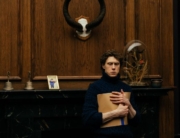![]() Frances Ha is yet another story about a white 20-something woman stuck in stalled adolescence in NYC, so it comes as something of a surprise that it’s so exhilarating to watch. It all plays rather like Woody Allen got out of bed one day and decided to direct an unusually upbeat episode of Girls, as if Girls had a Christmas special. The film even shares one of its actors with the show (Adam Driver, doing a less threatening variant of the same persona), which feels like a both a knowing nod and an admission of the similar territory that both entertainments tread.
Frances Ha is yet another story about a white 20-something woman stuck in stalled adolescence in NYC, so it comes as something of a surprise that it’s so exhilarating to watch. It all plays rather like Woody Allen got out of bed one day and decided to direct an unusually upbeat episode of Girls, as if Girls had a Christmas special. The film even shares one of its actors with the show (Adam Driver, doing a less threatening variant of the same persona), which feels like a both a knowing nod and an admission of the similar territory that both entertainments tread.
One mystery of Frances Ha is why it’s not more depressing. It’s a story you’ve seen before, enough times that you might feel like it’s your own even if it’s not: Frances (Gerwig), a 26-year-old New Yorker in a state of stalled development, pursues a career in dance with uncertain prospects, relies on tax returns to pay for dinner, and is generally still a kid. That the movie goes beyond the moribund to become almost euphoric is a testament to the filmmaking and acting.
It crackles with breakneck wit, trotting out sharp one-liners in an incessant parade that helps to buoy the familiar story. What sets this narrative apart is primarily the joy of Frances and the actress who portrays her, evincing an infectious charisma and lack of emotional self-indulgence even at her lowest points. Greta Gerwig’s charm has been proven elsewhere, but it’s worth stating again just how slyly seductive she can be, a personality that is at once aggravating and exaggerated without sacrificing charm.
When she runs through the streets of New York, leaping and twirling like a kid in a movie (which, after all, she is), it’s hard not to be swept along by her physical exuberance, just as it’s difficult not to notice the ways in which her peculiar grace falls short of the ideal. Gerwig dances and moves through space in a way that no amount of study will ever prevent from seeming haphazard. (And I mean that as a compliment.) There is something both helpless and aspirational about the way she handles her body, and when she flops carelessly back on her bed—or executes an impromptu, half-awkward spin in her apartment—you feel like the essence of her generation, or at least her demographic, has been distilled into a single gesture.
It’s something that’s apparent to the people who populate Frances’ world. The director at the dance company where Frances is an apprentice tries to shepherd her out of her aspirations as a performer. When she performs a few choice dance moves for her roommates (Adam Driver and Michael Zegan), they watch with an eagerness that just as easily could be either admiration or mocking. And one memorable conversation around the kitchen table ends in the conclusion that Frances has an old face but an immature disposition, a reminder that no fiction is wholly exempt from the exigencies of the real world.
The entire cast is effective to a T, deployed with an indifference that is both casual and studied. Each of them is a precisely modulated variant on a type (the best friend, the potential love interest, the cluelessly helpful parents) and makes you look at these familiar figures anew.
Sam Levy’s black-and-white photography is both a canny choice to enliven the proceedings and a pleasure to watch. Levy manages the trick of creating visuals that are at once crisp and low-fi, paying homage to both Manhattan and mumblecore without feeling like it’s stuck in either genre. Like everything about the film, it functions recognizably as a hallmark of a low-budget production as well as a demonstration of the creativity that limits can enable.
The visuals lend the film a retro tone that is matched by the heady pace of the editing, which cuts away from each scene like it can’t wait to get to the next. When accompanied by the blasts of music so jaunty they feel like commentaries on themselves, it brings to mind the French New Wave and the adrenaline rush of that movement’s careful carelessness. The pace also keeps the punch lines coming without giving time for the resultant laughter so that each scene’s euphoria or awkwardness bleeds into the next.
It’s an appropriate feeling for a film about people accustomed to a certain kind of distanced enjoyment, indulging in laughter that is both sincere and self-aware. There is an undeniable nihilism simmering beneath the surface, a hint at the darker vacancies engendered by self-centered lifestyles. But insecurity can be energizing as well as enervating, and it’s a precarious dose of the former that you get from watching Frances Ha, which is by turns uproarious, painful, and oddly delightful.







good review-makes me want to see it. MUD very good STAR WARS 3d an experience
love,nana